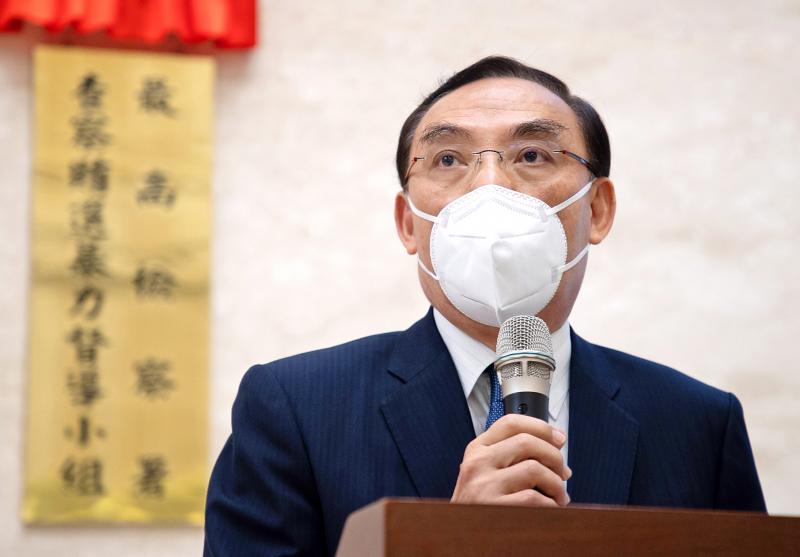The Supreme Prosecutors’ Office on Wednesday established a task force to combat bribery and election-related violence, which is to take special note of new methods of paying bribes, such as cryptocurrencies and mobile payments.
The November local elections would be a challenge for the judiciary, especially in three areas — bribery, fake news and possible foreign intervention — Minister of Justice Tsai Ching-hsiang (蔡清祥) said at the establishment ceremony.
Local prosecutors’ offices have established temporary command centers to provide technical support when investigating election cases, Tsai said, exhorting the task force to stop at nothing to prosecute any person seeking to sway an election through wealth or violence.

Photo: CNA
Law enforcement officers and the judiciary should also take note of new methods of payment, such as cryptocurrencies and mobile payment systems, which could replace traditional ways of paying bribes, he said.
The judiciary should closely monitor any abnormal payments to election candidates or their heelers via the ministry’s Financial Intelligence Unit, he added.
The judiciary must also pay attention to whether an election has been swayed by fake news and, in the instance of confirmed fake news, the judiciary must act swiftly to debunk the claims as soon as possible, Tsai said.
Talking about anti-bribery measures is still a useful ploy and adequate use of the Internet to disseminate the message would also help convince young people to call out any acts of vote-buying, Prosecutor General Hsing Tai-chao (邢泰釗) said.
The central government plans to create and distribute anti-bribery videos to local prosecutors’ offices, airports and railway stations, he said.
Anti-bribery efforts and measures to prevent coercion by force would continue as usual, but prosecutorial units would prioritize the prosecution of cases involving fake information, Hsing said.
He added that he would ask local prosecutors’ offices to task prosecutors with looking into cases of suspected foreign invention, while stepping up police sweeps of underground currency exchanges and betting pools.
Hsing also mentioned cryptocurrency, online game credits and other things with monetary value that could be used to bribe voters as something to look out for.
The judiciary would be looking very closely at whether the source of payments come from foreign sources and prosecute those involved for contravening the Anti-Infiltration Act (反滲透法), Hsing said.

The manufacture of the remaining 28 M1A2T Abrams tanks Taiwan purchased from the US has recently been completed, and they are expected to be delivered within the next one to two months, a source said yesterday. The Ministry of National Defense is arranging cargo ships to transport the tanks to Taiwan as soon as possible, said the source, who is familiar with the matter. The estimated arrival time ranges from late this month to early next month, the source said. The 28 Abrams tanks make up the third and final batch of a total of 108 tanks, valued at about NT$40.5 billion

Travel agencies in Taiwan are working to secure alternative flights for travelers bound for New Zealand for the Lunar New Year holiday, as Air New Zealand workers are set to strike next week. The airline said that it has confirmed that the planned industrial action by its international wide-body cabin crew would go ahead on Thursday and Friday next week. While the Auckland-based carrier pledged to take reasonable measures to mitigate the impact of the workers’ strike, an Air New Zealand flight arriving at Taipei from Auckland on Thursday and another flight departing from Taipei for Auckland on Saturday would have to

A group from the Taiwanese Designers in Australia association yesterday represented Taiwan at the Midsumma Pride March in Melbourne. The march, held in the St. Kilda suburb, is the city’s largest LGBTQIA+ parade and the flagship event of the annual Midsumma Festival. It attracted more than 45,000 spectators who supported the 400 groups and 10,000 marchers that participated this year, the association said. Taiwanese Designers said they organized a team to march for Taiwan this year, joining politicians, government agencies, professionals and community organizations in showing support for LGBTQIA+ people and diverse communities. As the first country in Asia to legalize same-sex

MOTIVES QUESTIONED The PLA considers Xi’s policies toward Taiwan to be driven by personal considerations rather than military assessment, the Epoch Times reports Chinese President Xi Jinping’s (習近平) latest purge of the Chinese People’s Liberation Army (PLA) leadership might have been prompted by the military’s opposition to plans of invading Taiwan, the Epoch Times said. The Chinese military opposes waging war against Taiwan by a large consensus, putting it at odds with Xi’s vision, the Falun Gong-affiliated daily said in a report on Thursday, citing anonymous sources with insight into the PLA’s inner workings. The opposition is not the opinion of a few generals, but a widely shared view among the PLA cadre, the Epoch Times cited them as saying. “Chinese forces know full well that